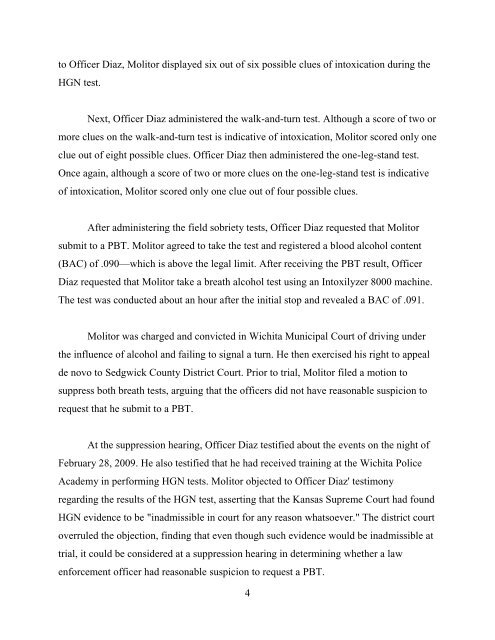Kansas Court of Appeals - 104940 â City of Wichita v. Molitor
Kansas Court of Appeals - 104940 â City of Wichita v. Molitor
Kansas Court of Appeals - 104940 â City of Wichita v. Molitor
You also want an ePaper? Increase the reach of your titles
YUMPU automatically turns print PDFs into web optimized ePapers that Google loves.
to Officer Diaz, <strong>Molitor</strong> displayed six out <strong>of</strong> six possible clues <strong>of</strong> intoxication during the<br />
HGN test.<br />
Next, Officer Diaz administered the walk-and-turn test. Although a score <strong>of</strong> two or<br />
more clues on the walk-and-turn test is indicative <strong>of</strong> intoxication, <strong>Molitor</strong> scored only one<br />
clue out <strong>of</strong> eight possible clues. Officer Diaz then administered the one-leg-stand test.<br />
Once again, although a score <strong>of</strong> two or more clues on the one-leg-stand test is indicative<br />
<strong>of</strong> intoxication, <strong>Molitor</strong> scored only one clue out <strong>of</strong> four possible clues.<br />
After administering the field sobriety tests, Officer Diaz requested that <strong>Molitor</strong><br />
submit to a PBT. <strong>Molitor</strong> agreed to take the test and registered a blood alcohol content<br />
(BAC) <strong>of</strong> .090—which is above the legal limit. After receiving the PBT result, Officer<br />
Diaz requested that <strong>Molitor</strong> take a breath alcohol test using an Intoxilyzer 8000 machine.<br />
The test was conducted about an hour after the initial stop and revealed a BAC <strong>of</strong> .091.<br />
<strong>Molitor</strong> was charged and convicted in <strong>Wichita</strong> Municipal <strong>Court</strong> <strong>of</strong> driving under<br />
the influence <strong>of</strong> alcohol and failing to signal a turn. He then exercised his right to appeal<br />
de novo to Sedgwick County District <strong>Court</strong>. Prior to trial, <strong>Molitor</strong> filed a motion to<br />
suppress both breath tests, arguing that the <strong>of</strong>ficers did not have reasonable suspicion to<br />
request that he submit to a PBT.<br />
At the suppression hearing, Officer Diaz testified about the events on the night <strong>of</strong><br />
February 28, 2009. He also testified that he had received training at the <strong>Wichita</strong> Police<br />
Academy in performing HGN tests. <strong>Molitor</strong> objected to Officer Diaz' testimony<br />
regarding the results <strong>of</strong> the HGN test, asserting that the <strong>Kansas</strong> Supreme <strong>Court</strong> had found<br />
HGN evidence to be "inadmissible in court for any reason whatsoever." The district court<br />
overruled the objection, finding that even though such evidence would be inadmissible at<br />
trial, it could be considered at a suppression hearing in determining whether a law<br />
enforcement <strong>of</strong>ficer had reasonable suspicion to request a PBT.<br />
4

















